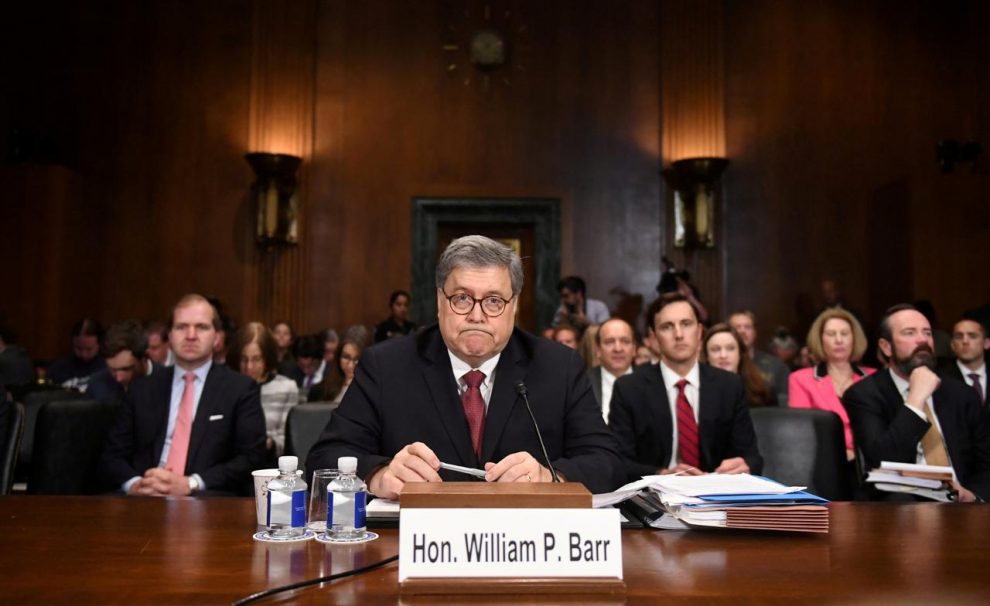The House Judiciary Committee voted Wednesday to recommend holding Attorney General Bill Barr in contempt of Congress for defying a subpoena for Special Counsel Robert Mueller’s unredacted Russia report and underlying documents, after President Trump asserted executive privilege in a bid to protect those files from release.
Both developments represented a major escalation in the already-tense fight between the two branches of government over access to information the Justice Department says cannot be legally released.
The committee’s 24-16 vote on contempt for Barr was along party lines and came after hours of debate. House leaders will now decide whether to take up the contempt citation on the House floor for a final vote. If approved, the measure would be referred to the U.S. attorney for the District of Columbia — who could choose not to act. House Democrats could also pursue a lawsuit.
“We were forced to take a day to move a contempt citation against the attorney general of the United States,” Committee Chairman Jerrold Nadler, D-N.Y., said after the vote. “We did not relish doing this, but we have no choice.”
He added, “We’ve talked for a long time about approaching a constitutional crisis. We are now in it.”
Earlier, after being notified of the president’s move to invoke executive privilege, Nadler said it shows the administration does not respect congressional oversight.
“By invoking executive privilege on all of our materials that are subject to subpoena, the process has come to a screeching halt,” Nadler said. “The administration has announced loud and clear that it does not recognize Congress as a co-equal branch of government with independent constitutional oversight authority and it will continue to wage its campaign of obstruction.”
Georgia Rep. Doug Collins, the top Republican on the committee, fired back at committee Democrats and called Wednesday’s vote a “cynical, mean-spirited, counterproductive and irresponsible step.”
“Democrats are angry the special counsel’s report did not produce the material or conclusions they expected to pave their path to impeaching the president. I feel compelled to remind everyone the report found that, despite offers to do so, no one from the Trump campaign knowingly conspired with the Russian government,” Collins said. “… They are angry our nation’s chief law enforcement officer and his deputy had the audacity to decide the evidence didn’t support charges for obstructing an investigation into something the president didn’t do.”
Chuck Schumer lays out ICE demands to avoid government shutdown
Obama-Era Report on ICE-Related Deaths Proves How Hypocritical Hysteria Over Alex Pretti’s Death Really Is
US moves fast to reopen Venezuela embassy after yearslong freeze
Josh Shapiro knocks Biden record, says Democrats failed to deliver results Americans could ‘see or feel’
Control of Donetsk is ‘one remaining item’ in Ukraine-Russia peace negotiations, Rubio says
Man who nearly beat Chicago train passenger to death walks free with no prison time: report
Cuba regime change, Iran faltering: Five takeaways from Rubio’s testimony to Congress
DHS honors Illinois woman whose corpse was allegedly abused by illegal immigrant freed under sanctuary laws
VIDEO: Trump Tries Out New Insult on ‘ABC Fake News’ Reporter, Then Hits Her with the Art of the Deal
Rubio says US has no plan to use force in Venezuela — but warns ‘imminent threat’ could change that
FBI agents search election hub in Fulton County, Georgia
Op-Ed: How Pro-Life Republican Leaders Are Delaying the End of Abortion
Watch: As Chants Ring Out About Lynching Kristi Noem, Clueless Lib Protesters Realize to Their Horror Who They’re in Bed With
Anheuser-Busch praised for patriotic Budweiser Super Bowl ad after Bud Light controversy
Child Sex Abuse Material Made with AI Surges to Shocking New Levels
The president’s decision to invoke privilege came after the Justice Department, late Tuesday night, requested that the House Judiciary Committee postpone the scheduled vote to hold Barr in contempt. The Justice Department warned that if the committee did not postpone, the attorney general would recommend that Trump claim executive privilege over the materials.
On Wednesday, the White House did just that.
“The Attorney General has been transparent and accommodating throughout this process, including by releasing the no-collusion, no-conspiracy, no-obstruction Mueller Report to the public and offering to testify before the Committee. These attempts to work with the Committee have been flatly rejected. They didn’t like the results of the report, and now they want a redo,” Press Secretary Sarah Sanders said in a statement on Wednesday. “Faced with Chairman Nadler’s blatant abuse of power, and at the Attorney General’s request, the President has no other option than to make a protective assertion of executive privilege.”
Assistant Attorney General Stephen Boyd sent a letter to Nadler on Wednesday morning saying the same.
“We are disappointed that you have rejected the Department of Justice’s request to delay the vote of the Committee on the Judiciary on a contempt finding against the Attorney General this morning,” Boyd wrote, adding that the committee has “terminated our ongoing negotiations and abandoned the accommodation process” related to the subpoena.
“Unfortunately, rather than allowing negotiations to continue, you scheduled an unnecessary contempt vote, which you refused to postpone to allow additional time for compromise,” Boyd wrote. “Accordingly, this is to advise you that the President has asserted executive privilege over the entirety of the subpoenaed materials. As I indicated in my letter to you last night, this protective assertion of executive privilege ensures the President’s ability to make a final decision whether to assert privilege following a full review of these materials.”
In a separate letter sent Tuesday, Boyd stressed that Barr already has offered a select group of congressional Democrats the opportunity to review a “minimally redacted” version of the report, “excluding only grand jury information,” but Nadler and Democrats have refused to “even review” the materials.
The vote to hold Barr in contempt escalates the standoff between the Justice Department and congressional Democrats over Mueller’s full report, and over Barr’s failure to appear for a scheduled hearing before the committee last week after disagreements over the format of the hearing. Democrats on the committee wanted to have their staff question Barr. The Justice Department wanted only members to do the questioning. Barr did not appear, and the committee held a meeting with an empty witness chair.
Democrats have blasted Barr for weeks over his handling of the special counsel’s report. Barr initially released a four-page summary of Mueller’s findings, announcing in late March that the special counsel found no evidence of collusion between members of the Trump campaign and Russia during the 2016 presidential election. Mueller did not come to a conclusion on whether the president obstructed justice, but Barr said the evidence was not sufficient to charge the president with such an offense.
Chuck Schumer lays out ICE demands to avoid government shutdown
Obama-Era Report on ICE-Related Deaths Proves How Hypocritical Hysteria Over Alex Pretti’s Death Really Is
US moves fast to reopen Venezuela embassy after yearslong freeze
Josh Shapiro knocks Biden record, says Democrats failed to deliver results Americans could ‘see or feel’
Control of Donetsk is ‘one remaining item’ in Ukraine-Russia peace negotiations, Rubio says
Man who nearly beat Chicago train passenger to death walks free with no prison time: report
Cuba regime change, Iran faltering: Five takeaways from Rubio’s testimony to Congress
DHS honors Illinois woman whose corpse was allegedly abused by illegal immigrant freed under sanctuary laws
VIDEO: Trump Tries Out New Insult on ‘ABC Fake News’ Reporter, Then Hits Her with the Art of the Deal
Rubio says US has no plan to use force in Venezuela — but warns ‘imminent threat’ could change that
FBI agents search election hub in Fulton County, Georgia
Op-Ed: How Pro-Life Republican Leaders Are Delaying the End of Abortion
Watch: As Chants Ring Out About Lynching Kristi Noem, Clueless Lib Protesters Realize to Their Horror Who They’re in Bed With
Anheuser-Busch praised for patriotic Budweiser Super Bowl ad after Bud Light controversy
Child Sex Abuse Material Made with AI Surges to Shocking New Levels
While Democrats have criticized Barr for that swift conclusion, they have sought the completely unredacted version of the report in a bid to learn more about what information Mueller gathered regarding the obstruction probe. The report released publicly last month had redactions covering sensitive sources and methods, grand jury material, and other areas to protect the reputational interests of “peripheral players” in the investigation.
While Democrats have complained about the DOJ’s redactions in the publicly available report, however, Barr and his deputies have countered that they’ve made available to select members a version with minimal redactions — and Democrats have declined to look at it.
“Unfortunately, the Committee has responded to our accommodation efforts by escalating its unreasonable demands and scheduling a committee vote to recommend that the Attorney General be held in contempt of Congress,” Boyd wrote.
























